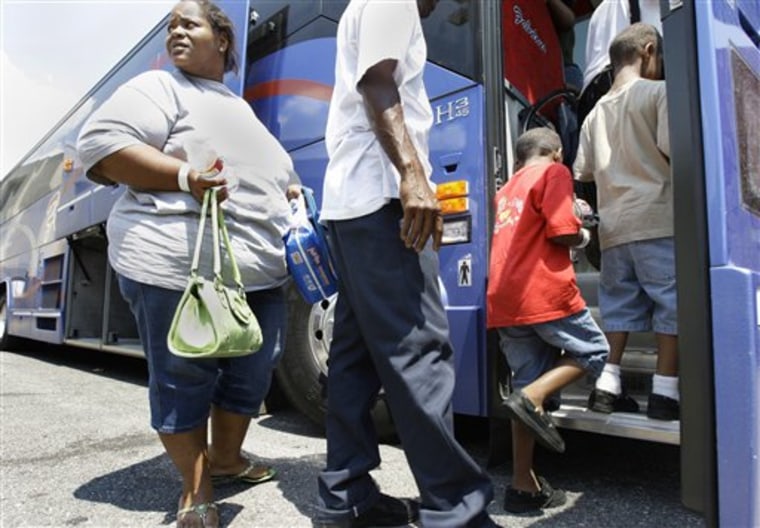Darryl Campbell began his Hurricane Gustav escape at 4 a.m. ET Saturday. After 10 hours of lines and traffic, he was finally speeding down the highway to an uncertain future in either Shreveport, La, or farther north in Arkansas.
With swing jazz piping through the bus speakers, and the slouched shoulders of the elderly and poor filling the seats, he borrowed a cell phone to check on his mother, who had boarded another bus to flee to Baton Rouge.
"The Lord is with everyone, so of course everything would be OK" with her, he said, finishing his call and handing the phone back to its owner, a furniture maker who goes by his artisan name Ramsey.
Nearly all the 50 people on the ride said they may never return home, including Ramsey.
"I think once I get there to Arkansas I'm going straight to Stone Mountain, Georgia," said the 51-year-old, who has family in Stone Mountain. "I gave myself a year and a half to make it in New Orleans. But the city isn't back from Katrina, and it's time to leave."
Campbell, 37, did not disagree. He had been working for room and board at the Ozanam Inn homeless shelter in New Orleans.
Long wait before the drive
Thousands of people were evacuated from New Orleans on Saturday, starting their journey at bus stops throughout the city, from where they were taken to a central terminal where they waited in lines stretching nearly a mile. Too poor to find their own means to get out, they boarded more buses there to evacuation points around the state and beyond.
The Interstate out of town became a place for evacuees to ponder their futures and the future of the storm-threatened city at their backs.
A few said they were eager to return to New Orleans no matter what Gustav left in its wake, particularly if they wound up staying in Shreveport, 400 miles away but still in the same state.
But the bus driver was uncertain if the shelter would have space or if they would have to press on another 230 miles to Fort Chaffee, a former Army base near the city of Fort Smith in northwest Arkansas.
"Arkansas. Are you ready for Arkansas?" asked Damien Foster, 44, a chef who knew something about hurricane displacement. He left his hometown New Orleans during Katrina and ended up spending the next two and a half years in West Palm Beach, Fla. He had only been back in New Orleans for six months when he had to leave again.
Foster flung his arm around a young woman he had never met before, and said he might have to give up on the city for good this time. "If I can find the work, I don't have to go back," he said.
Anger at TV cameras
As they continued to talk, Mike Watson, 49, passed their seats. He had cooled off from being angry earlier in the day at television news reporters who pointed their cameras at his family of four struggling with their luggage in the evacuation line.
"Exploitation. That's what it felt like," said the construction worker. "It's just making us look like refugees."
Watson said he would also consider a new life in Arkansas. He described himself as a lifelong New Orleans resident, finally beaten by the high rents brought on by the Katrina housing shortage and by the new storm coming to town.
"I can make it anywhere," he said. "That's what those cameras don't understand. Everyone on this bus just wants a better life, no matter where we find it."
